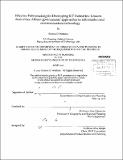Effective policymaking for developing ICT industries : lessons from three African governments' approach to information and communications technology
Author(s)
Watkins, Kristen D
DownloadFull printable version (8.150Mb)
Alternative title
Effective policymaking for developing information and communication technology industries
Other Contributors
Massachusetts Institute of Technology. Dept. of Urban Studies and Planning.
Advisor
Amy Glasmeier.
Terms of use
Metadata
Show full item recordAbstract
This thesis studies the effect of different information and communication technology (ICT) policies on the performance of the ICT industry in a given country. Many developing country governments are in the process of focusing more on developing their ICT industries as a mechanism to improve economic development levels in their country. In order to analyze effectiveness of policies, six main policy levers are compared: competition level of the industry, ICT regulatory bodies, privatization level of the industry, universal access initiatives, ICT education initiatives, and infrastructure development and coordination. By looking at each of these policy levers in the three countries of study, Rwanda, Uganda, and Zambia, certain policies seem to emerge as more important and effective than others. Competitiveness of the industry seems to be a large determinant in usage rates within the country of the internet and mobile phones, and an active regulatory body is imperative to future sustainable growth in the industry. Initiatives that address equity of access and improve ICT literacy have a small effect on usage rates; due to the fact that these initiatives are relatively recent, it is expected that these projects will have a larger effect on future usage rates in each country. In sum, this thesis contributes to a topic that has seen little academic research but has massive implications for the economic future of a country; ICT is critical to successful business in the new digital age, and proper ICT policies can help countries accelerate their economic development.
Description
Thesis (M.C.P.)--Massachusetts Institute of Technology, Dept. of Urban Studies and Planning, 2012. Cataloged from PDF version of thesis. Includes bibliographical references (p. 83-89).
Date issued
2012Department
Massachusetts Institute of Technology. Department of Urban Studies and PlanningPublisher
Massachusetts Institute of Technology
Keywords
Urban Studies and Planning.